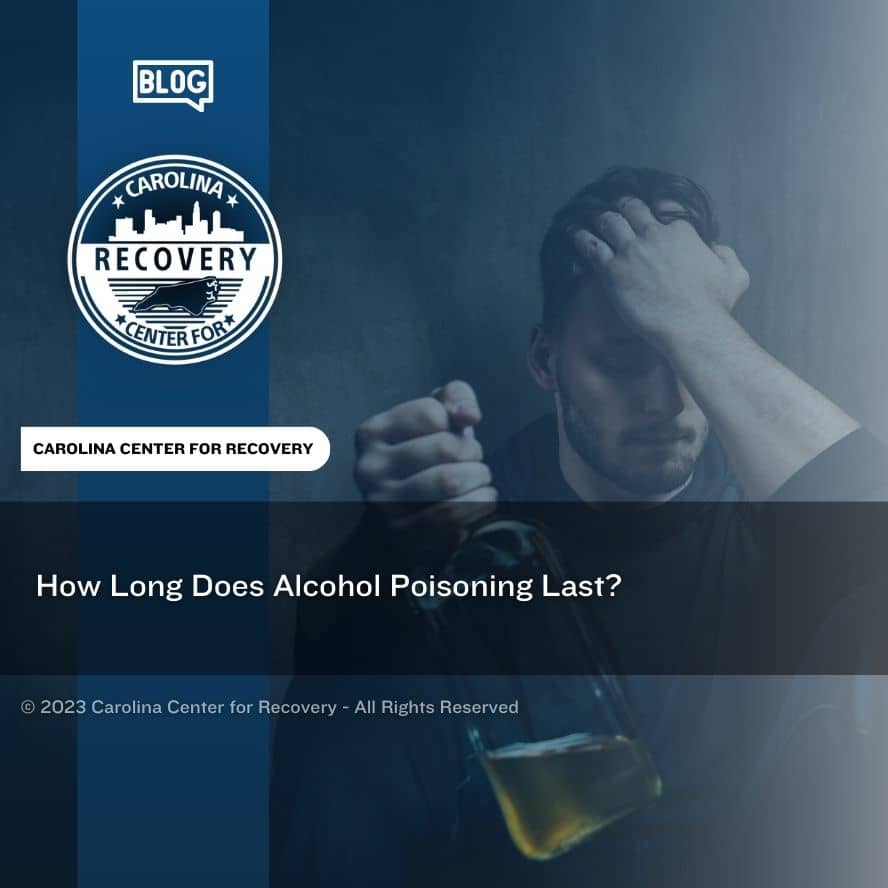How Long Does Alcohol Poisoning Last?

Medically Verified: 2/1/24
Medical Reviewer
Chief Editor

All of the information on this page has been reviewed and verified by a certified addiction professional.
Drinking too much alcohol can cause alcohol poisoning. An alcohol overdose is a life-threatening emergency. It’s crucial to prevent alcohol overdose and recognize the symptoms of alcohol poisoning so you can seek medical attention.
This article will explain the risk of alcohol poisoning and how to recognize it. You will also learn how long alcohol poisoning lasts and where to find treatment for alcohol abuse.
Reach out to the Carolina Center for Recovery specialists now to learn about our effective treatment programs. You may also schedule an intake assessment, verify your insurance, or ask questions.
How Many Drinks Does it Take to Get Alcohol Poisoning?
Alcohol affects each person differently. Many things can affect how your body responds to alcohol and how quickly you metabolize it. These factors include:
- Age
- Weight and body composition
- Gender
- Metabolism
- The type of alcoholic beverages you drink
- How much you drink
- How quickly you drink
- How much you’ve eaten before drinking
- Your alcohol tolerance
- Other drugs you use, including prescription medications
According to the Centers for Disease Control (CDC), a drink is:
- 12 ounces of beer
- 5 ounces of wine
- 1.5 ounces of distilled spirits (vodka, whiskey, rum, etc.)
It’s impossible to determine exactly how many drinks it would take to cause alcohol poisoning from person to person. Many alcoholic beverages contain multiple servings of alcohol.
How Does Alcohol Affect Your Body?
When you consume alcoholic beverages, the alcohol enters the bloodstream. The more you drink, the more alcohol will be in your bloodstream. This is called your blood alcohol concentration (BAC). Generally, a higher BAC means a greater risk of alcohol poisoning.
Here are some of the effects of each BAC level:
- 0-0.05%: You may feel relaxed or drowsy. Some people may notice slight changes in their coordination, speech, and memory.
- 0.06-0.15%: Alcohol intoxication at this level will impair your driving ability. You may lose coordination or have memory and speech problems.
- 0.16-0.30%: Alcohol intoxication significantly affects your memory, speech, coordination, and decision-making skills. Some people may exhibit signs of alcohol poisoning at this stage. These may include vomiting and losing consciousness.
- 0.31-0.45%: Many will have symptoms of alcohol poisoning. Breathing may become shallow, and heart rate may slow down.
Your BAC continues to rise for about 40 minutes after your last drink. This means you could experience alcohol poisoning even after you’ve stopped drinking.
Symptoms and Side Effects of Alcohol Poisoning
Knowing the symptoms of alcohol poisoning can help you get help quickly. People with alcohol poisoning often have symptoms that include:
- Confusion
- Disorientation
- Loss of coordination
- Vomiting
- Slow breathing (less than eight breaths per minute)
- Irregular breathing (10 or more seconds between breaths)
- Slow heart rate
- Low body temperature
- Cold, clammy, pale, or blue skin
- Unresponsiveness
- Difficulty staying awake
- Passing out or loss of consciousness
- Seizures
If someone near you is showing signs of alcohol poisoning, call 911. People may suffer brain damage or die if they do not receive timely medical care.
If it is safe to do so, roll the person onto their side to prevent choking on their vomit. Wait with the person until EMS arrives.
How Long Does Alcohol Poisoning Last?
The duration of alcohol poisoning can vary depending on factors such as the amount of alcohol consumed, individual tolerance levels, and how quickly medical treatment is obtained.
Typically, the effects of alcohol poisoning can last anywhere from a few hours to several days. However, seeking medical attention promptly is crucial as untreated alcohol poisoning can lead to severe complications or even death.
It’s essential to remember that alcohol poisoning is a medical emergency, and if you suspect someone may have alcohol poisoning, it’s important to call emergency services immediately for assistance.
How Do You Treat Alcohol Poisoning?
People with alcohol poisoning require medical treatment in a hospital. Medical professionals will carefully monitor and observe the person and provide essential care.
Treatment for alcohol poisoning may include:
- Intubation or oxygen therapy to help with breathing
- Pumping the stomach to remove alcohol from the body
- Hemodialysis, which is a process that can remove alcohol from the body faster
- IV fluids to provide essential vitamins and maintain healthy blood sugar levels
People may remain in the hospital until they are stable enough to go home.
How Can I Prevent Alcohol Poisoning?
Alcohol poisoning can be life-threatening. It’s important to take steps to prevent alcohol poisoning. Here are some things you can do to reduce your risk:
- Drink in moderation. For women, this means one or fewer drinks per day. For men, this means two or fewer drinks daily.
- Don’t drink on an empty stomach. Eat before drinking. Continue to eat while drinking.
- Drink water. Have a glass of water between alcoholic drinks.
- Keep track of your alcohol consumption.
- Avoid binge drinking (drinking a lot in a short period).
- Talk to your doctor about how your medications can interact with alcohol.
Don’t take chances with alcohol poisoning. Know how much you’re drinking. Limit your alcohol consumption. If you have trouble reducing the amount you drink, seek professional treatment to regain control.
Find Alcohol Abuse Treatment
If you or someone you love struggles with heavy or binge drinking, you are not alone. Reach out to the specialists at the Carolina Center for Recovery to learn about our alcohol abuse treatment programs. You may also schedule an intake evaluation or ask questions.

